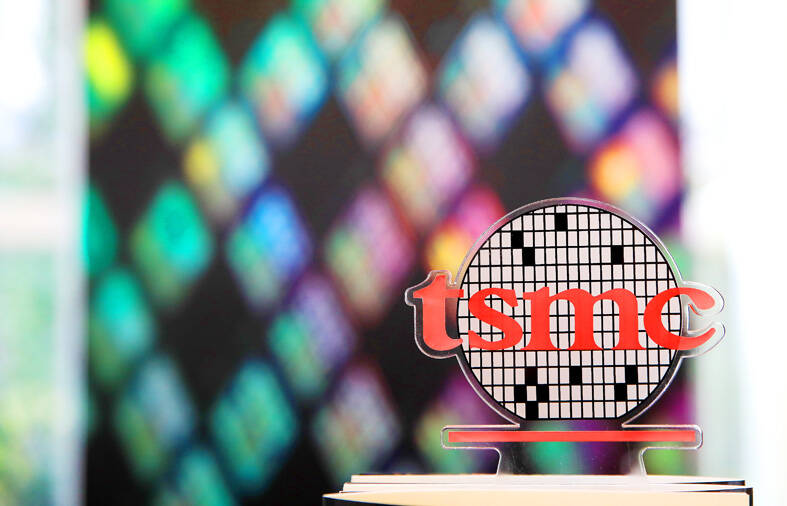Taiwan Semiconductor Manufacturing Co (TSMC, 台積電) yesterday said that its sales fell more than 18 percent last month from January, with market analysts attributing the decline to continued inventory adjustments in the global IC industry.
TSMC, the world’s largest contract chipmaker, said that its consolidated sales last month fell 18.4 percent from a month earlier to NT$163.17 billion (US$5.29 billion), the lowest since February last year, when the chipmaker posted revenue of NT$146.93 billion.
However, on an annual basis, consolidated sales rose 11.1 percent and were the highest-ever for February.

Photo: Cheng I-hwa, Bloomberg
Cumulative consolidated revenue in the first two months of this year totaled NT$362.23 billion, up 13.8 percent from a year earlier.
At an investors’ conference in the middle of January, TSMC forecast that consolidated sales would range between US$16.7 billion and US$17.5 billion this quarter, with the median figure of US$17.1 billion representing a 14.2 percent drop from the fourth quarter of last year, citing weakening global demand.
TSMC made the estimate based on a US dollar exchange rate of NT$30.7.
Its consolidated sales for this month would be NT$149.4 billion to NT$174.0 billion, according to the January estimate.
TSMC’s five top clients — Advanced Micro Devices Inc, Nvidia Corp, MediaTek Inc (聯發科), Qualcomm Inc and Intel Corp — have scaled back their orders as the impact from inventory adjustments appeared more serious than previously anticipated, foreign media reported.
Under such unfavorable circumstances, TSMC could this quarter see a sequential fall in consolidated sales of more 17 percent, one media report said.
However, TSMC has left its guidance unchanged.
In January, TSMC also said that sales in the first half of this year would fall by 4 to 9 percent from a year earlier, but with inventories declining in the second half, demand is expected to recover.
Sales next year would grow slightly in US dollar terms from a year earlier.
Meanwhile, Chinese-language media yesterday reported that TSMC had slowed the timeline for setting up a plant in Europe and shifted its attention to the possibility of building a 12-inch fab in Singapore, after the city-state expressed its willingness to provide more tax incentives and subsidies on water and power consumption than European governments.
The reports said the EU and Germany, Europe’s largest economy, had encountered bottlenecks in their budgets, sparking uncertainty whether TSMC’s needs, including tax incentives, can be met.
In response, TSMC said that setting up a fab in Europe to produce chips used in automotive electronics and specialty processes remained under consideration.
It added that it would decide where to set up production sites based on clients’ needs and support by local governments.

BYPASSING CHINA TARIFFS: In the first five months of this year, Foxconn sent US$4.4bn of iPhones to the US from India, compared with US$3.7bn in the whole of last year Nearly all the iPhones exported by Foxconn Technology Group (富士康科技集團) from India went to the US between March and last month, customs data showed, far above last year’s average of 50 percent and a clear sign of Apple Inc’s efforts to bypass high US tariffs imposed on China. The numbers, being reported by Reuters for the first time, show that Apple has realigned its India exports to almost exclusively serve the US market, when previously the devices were more widely distributed to nations including the Netherlands and the Czech Republic. During March to last month, Foxconn, known as Hon Hai Precision Industry

Taiwan Semiconductor Manufacturing Co (TSMC, 台積電) and the University of Tokyo (UTokyo) yesterday announced the launch of the TSMC-UTokyo Lab to promote advanced semiconductor research, education and talent development. The lab is TSMC’s first laboratory collaboration with a university outside Taiwan, the company said in a statement. The lab would leverage “the extensive knowledge, experience, and creativity” of both institutions, the company said. It is located in the Asano Section of UTokyo’s Hongo, Tokyo, campus and would be managed by UTokyo faculty, guided by directors from UTokyo and TSMC, the company said. TSMC began working with UTokyo in 2019, resulting in 21 research projects,

Ashton Hall’s morning routine involves dunking his head in iced Saratoga Spring Water. For the company that sells the bottled water — Hall’s brand of choice for drinking, brushing his teeth and submerging himself — that is fantastic news. “We’re so thankful to this incredible fitness influencer called Ashton Hall,” Saratoga owner Primo Brands Corp’s CEO Robbert Rietbroek said on an earnings call after Hall’s morning routine video went viral. “He really helped put our brand on the map.” Primo Brands, which was not affiliated with Hall when he made his video, is among the increasing number of companies benefiting from influencer

Quanta Computer Inc (廣達) chairman Barry Lam (林百里) yesterday expressed a downbeat view about the prospects of humanoid robots, given high manufacturing costs and a lack of target customers. Despite rising demand and high expectations for humanoid robots, high research-and-development costs and uncertain profitability remain major concerns, Lam told reporters following the company’s annual shareholders’ meeting in Taoyuan. “Since it seems a bit unworthy to use such high-cost robots to do household chores, I believe robots designed for specific purposes would be more valuable and present a better business opportunity,” Lam said Instead of investing in humanoid robots, Quanta has opted to invest